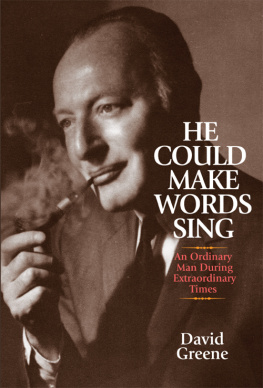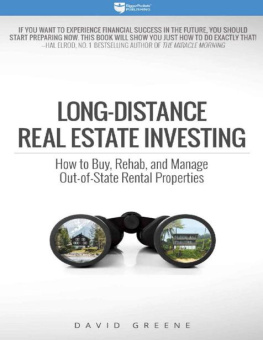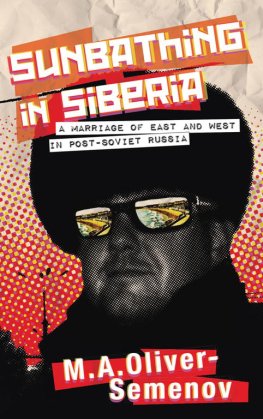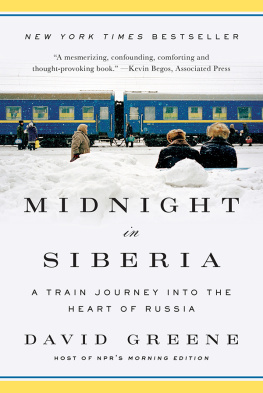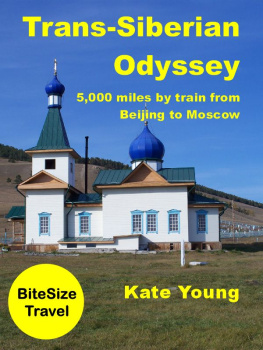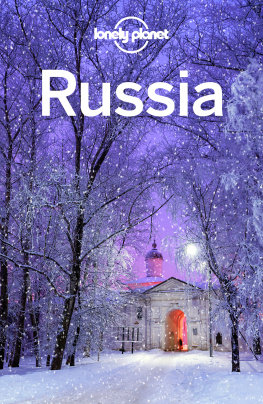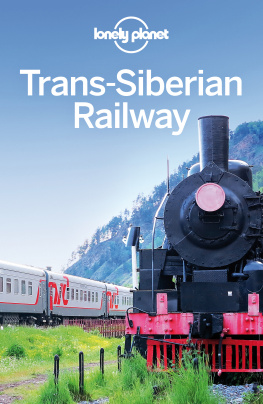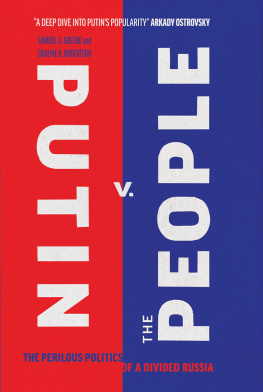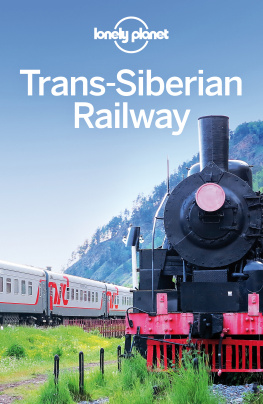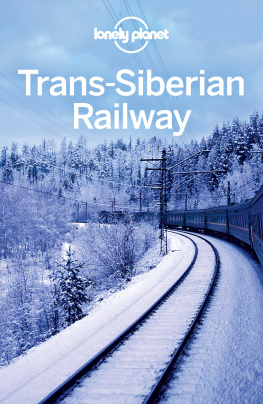MIDNIGHT
in SIBERIA
A Train Journey into
the Heart of Russia
DAVID GREENE

Midnight in Siberia is a work of nonfiction. Some of the names and certain identifying details have been changed.
T O MY WIFE, R OSE
CONTENTS
The Trans-Siberian Railway is Russias spine, a thin line of constancy that holds this unwieldy country together. Its more than just a map that underscores this. The railroad connects families, bringing distant relatives together more affordably than air travel. And it connects different chapters in this countrys journeytoday, high-speed luxury trains carry Russias uber-elite and standard-class trains carry business travelers, tourists, and families, all following the same path used by Stalin to ship political prisoners to the Siberian gulags.
While the Trans-Siberian, as broadly defined, includes a number of different routes, the primary two connect Moscow to Ulan-Ude, where one route continues east to Vladivostok and the other (the Trans-Mongolian) dips south to Beijing. I decided to stickmostlyto the all-Russia route, using the train as a vehicle and guide, seeing Russia from west to east. I did take a few detours, as you can see. I jogged over to Yaroslavl, not a stop on the main route. Same goes for Izhevsk. And I took a bus down to Chelyabinsk, hoping to pick up a southern branch of the Trans-Siberian to reconnect with the main route in Omsk. That plan fell apart when I realized I would need a Kazakh visa for a bit of that trip. It proved far more efficient to backtrack to Ekaterinburg than to take a last-minute gamble at the Kazakh consulate. From Ekaterinburg, it was a rather straightforward trip eastbound (save for a heart-thumping hovercraft ride across Lake Baikal and a late-night jump back on the train in the village of Baikalsk). Then we hugged the Chinese border, before swinging a sharp right turn and completing the home stretch into the Pacific port of Vladivostok. There we arrived, after 5,772 miles (if wed stayed on course), more tea than vodka (not by much), more instant noodles than fresh meals (by a lot), and a whole lot of conversation.

W ASNT HISTORY supposed to end in 1991?
Apocalyptic at that sounds, it was essentially the prediction of a political scientist named Francis Fukuyama who two years before that had penned an essay called The End of History?
As anti-Communist fervor was building around the world, Fukuyama argued that the East-West battle of ideas which fueled the Cold War was finally coming to an end. He favored nuance over finality, predicting that the world had not seen the last of totalitarian regimes and community ideology. They would ebb and flow and influence events here and there. But the trend was unmistakable: Liberal democracy, parliamentary-style governments, and market-driven economics were taking hold in more and more countries of the world. That would more or less continue. The great debate was over.
Fukuyama sure seemed prescient in December 1991, when the Soviet Union was dissolved.
The question worth asking in 2014 is whether weve arrived at the end of the End of History.
Russia, led by its enigmatic, macho leader, Vladimir Putin, blatantly ignored pleas and warnings from the West and forcibly annexed Crimea, which was (and remains, if you ask the most wishful thinkers) part of the sovereign nation of Ukraine. To foreign policy alarmists, this marked the resumption of the Cold War. To even the coolest minds, it was a seminal event likely to poison the Wests relations with Russia.
Henry Kissinger, former U.S. secretary of state and one of the worlds most influential foreign policy minds, wrote in the Washington Post following the Crimea annexation that it is dangerous to view Ukraine as a showdown over whether the sovereign nation joins the East or the West. Ukraine has to function, Kissinger wrote, as a bridge between them.
He went on to argue that the West certainly has interests in Ukrainegrowing economic and cultural tiesbut that so does Russia, perhaps even more. Kiev was the birthplace of the Russian Orthodox religion. Ukraine has been strategically important to Russia for centuries, especially Crimea, where Russia maintains its Black Sea naval fleet. And in Crimea and eastern Ukraine, many people speak Russian and feel a closer cultural connection to the East.
Kissinger wrote that each side has to recognize the interests of the other. He didnt hold out much hope for that: Putin is a serious strategiston the premises of Russian history. Understanding U.S. values and psychology are not his strong suits. Nor has understanding Russian history and psychology been a strong point of U.S. policymakers.
His casting of this modern conflict represents just one view. But its hard to argue with the reality he underscores: At worst, Ukraine could become a colossal misunderstanding that morphs into a new showdown. At best, Ukraine can be used as a bridge between competing interests and philosophies. Either way, the old fault line and the East-West battle over ideas, territory, and influence remain present today.
All of this has been building of course. The United States and its allies were furious when Russia invaded its neighbor Georgia in 2008. Likewise, Russia was furious in 2011 when it agreed under enormous pressure to abstain rather than veto on a UN vote to approve NATO military action in Libya, given assurances that NATO was going to tread delicately. NATO bombs were dropping within days.
There are reasons to think these tensions may die down. Russia and the West have shared interests, and theyve worked together effectively at timeson space exploration and pressuring Syria to hand over its chemical weapons stockpile. Russias global dominance in energy may also be fading, and that could weaken Russias economy to a point where it must either get along with the West or face economic deprivation and collapse from within. But for now, Putin clearly believes that a stand-off with the West is in Russias strategic interest and that hes strong enough to pull it off.
Just as notable as Russias aggressiveness abroad is Putins management of the home front. In recent years, he has solidified the Kremlins control over local and regional governments, pressured news organizations, curtailed the right to protest, and targeted minoritiesmost glaringly, Russians who are gay and lesbian. He has also threatened human rights organizations, especially those that receive funding from the United States and elsewhere abroad.
Most stunning? By all accountsand admittedly, polling in Russia is often unreliablePutin is more popular than ever.
On May 1, 2014, more than one hundred thousand Russians descended on Red Square to celebrate their president and cheer his conquering of Crimea. It was arguably the most impressive display of Russian patriotism since the Soviet collapse and quite a counterpoint to the anti-Putin protests of 2011 that received plenty of attention from Western media but appear, for the moment, largely forgotten.
If we think of 2014 as a snapshot, what do we see? A Russian leader moving further away from Western democratic values. An East-West divide marked by growing mistrust. A military stand-off that has seen both NATO and Russian forces mobilizing and carrying out exercises with the aim of intimidating.
This moment may not mark the end of Fukuyamas End of History. Perhaps this is one of those moments he predicted when the Cold War enemy would score a blow, on the ultimate path to defeat.
Im tempted to look at this moment differently: as a reminder that culture and history matter, values and traditions endure, peoples of the world have different instincts, wishes, priorities, and dreams. It is easy to see Vladimir Putin as an authoritative leader with his own selfish motivations who has been able to squash anyone who wants to protest and dupe everyone else into letting him lead. That portrayal may hold some truth. But Putin, popular as ever, shrewd as always, also embodies a Russian soul that is unfamiliar to many in the West.
Next page

